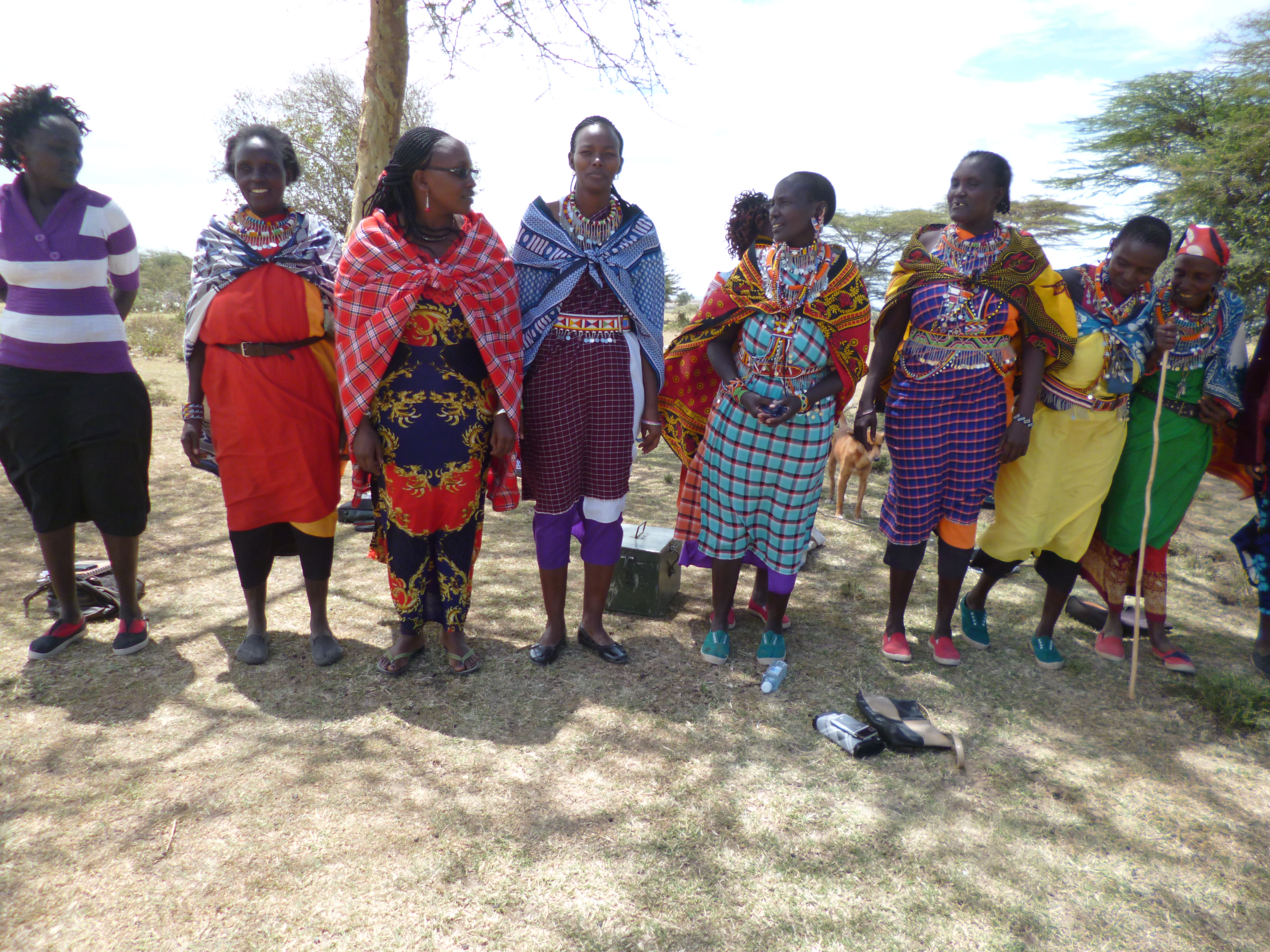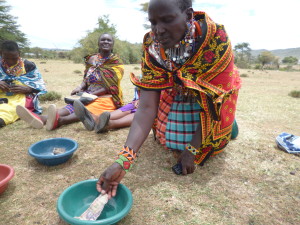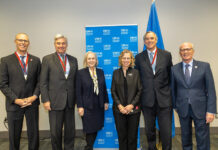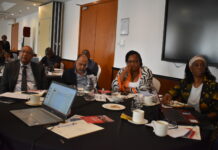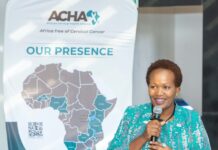By Mary Mwendwa
Emarti Village, Narok County: It is a hot sunny afternoon at Emarti village, Maasai Mara, dressed in a yellow faded T-shirt and skirt, slim tall and chocolate with short hair, Charity Naramiririsho holds her baby tightly as she arranges flour and other assorted goods at her home-based shop.
Her house which doubles as a shop is a household name to many at Emarti Village. Inside the single-roomed shop with iron sheets roof, buyers are busy streaming one by one, many are women and children buying goods like cooking fat, milk, tea leaves, soap, and others.
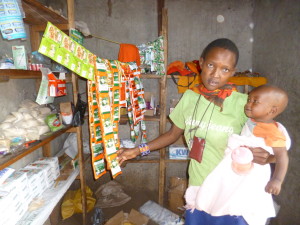
The twenty-four-year-old mother of four, speaks Swahili fluently unlike her fellow women who most cannot understand a word in Swahili or English. Charity is a member of Iretisho women’s Group where she chairs 17 members. She is among many who are transforming their lives through small businesses that have been enabled through the training gained from Community Managed Microfinance(CMMF) Project managed by Basecamp Foundation.
“I managed to start running this business after I was trained through the CMMF project together with other group members. I did not have any business skills initially, and this made my life difficult as I could not even do simple book keeping of my business. I started this shop in 2012, immediately after we formed our group of women and got training from Basecamp. My shop serves villagers here and iam happy it provides for my small family of five.”
Charity’s shop currently holds a stock of 19,000 Ksh -21,000ksh. She says she first borrowed money from someone, 12,000ksh that enabled her to restock her shop.” We meet every Saturday in our group, sit under a tree contribute each 200ks and save in a box that goes with one of our members who keep it safe and only opens when two other members are present. The two other members also keep one key for the box too. These savings have really helped us as Maasai women, we now own livestock of our own, something that was a dream for us.”Charity explains.
Pauline Makutsa, Chief Operations Officer, Base Camp Foundation says projects like CMMF have helped to change the face of the Maasai women in the Mara.”Women are now people of substance and as a foundation, we are supporting them in various ways like training to see them get better in their lives. These women are now part of conservation efforts in the Mara, they get to sell their products to tourists, some get jobs in the camps and collectively their lives are transformed.
The first Sustainable Development Goal of ending poverty remains a challenge to many developing nations in Sub-saharan Africa. Noble programs like CMMF could come in handy in tackling the problem in some way.
Nolamala Kasoe who does not know her age and cannot speak in Swahili narrates her success through a translator in Maasai Language.”I must testify that after joining this women’s group I have my life has turned around. I was so naïve and did not know anything apart from taking care of children at home. My husband was all I knew in my life, he was the sole provider for everything and even the decision-maker in every small bit of decision in my life. After several months of training with Basecamp team, I was able to learn about business skills and many other things that relate to my life that have helped me turn around my desperate life. I do beadwork and sell my products to tourists who visit the Mara, at times a get tender from the lodges and camps here to supply my products. I can now hold the money of my own and plan what I want with it. My husband now respects me because I can now add something to the table.’’
Similarly,Ann Nguruna , a 38-year-old business lady at Talek Market is a true reflection of what business training skills have managed to impact women in the Mara.”I was just a normal Masaai woman who used to hawk goods in Talek Market, my story of hope and resilience can only be attributed to the efforts I made through a support group that was formed with the help of a Base camp Foundation.”
Ann boasts of running a private school, a school uniform shop, and also supplies farm products to the residents of Talek town in the Maasai Mara, Narok County.
Her home which is located a few meters from Talek center tells it all. With a permanent house, a garden, and zero-grazing cows she stands out in many of the homes around her.”I decided to have a garden with vegetables and fruits to supplement my family diet and also have zero grazing cows which give me 16 liters of milk every day. I sell part of the milk and the rest remains for family consumption. ‘A jovial Ann says.
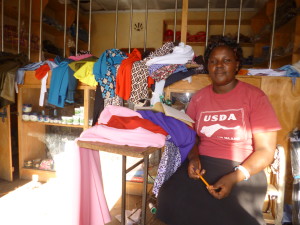
She has four zero grazing cows and five calves which she gets at least six liters of milk which she sells at 70 ksh per liter.Ann continues to narrate her success story, “As I said earlier, I used to hawk small products in this Talek market before, I started running an Agrovet shop in 2006. The agro vet shop did so well and I decided to switch to uniform business after we formed a school together with other two women. This shop I bought from someone with stock worth 20,000 Ksh and started running in 2013. Right now I have a stock worth 250,000 ksh at the moment and I believe this will increase with time.”
Ann recalls how the need for uniforms was evident that she decided to switch to the business of uniforms .”This shop has uniforms and also tailoring services where I have employed two tailors and I have other assorted household goods for the customers too.”
A member of Kamunyak women group which has received a lot of training from Basecamp Foundation on business skills , she has a lot of gratitude on the training she got and other members of her group.”We are able to run businesses in this town and this has placed the Maasai woman in a position where she is no longer vulnerable to drought and other challenges that face the Maasai woman. I can now make money on my own and this has really helped me at the family level. My husband too supports me in all this.
Ann has been able to get empowered in many ways. One thing that makes her unique among her peers is that she has not circumcised her now teenage daughter who is in a medical school.”I decided not to take my daughter through the tough cultural practice because I am now empowered and cannot bow down to those cultures that put women in vulnerable situations in society. Women in my community have a lot of challenges that hinder them from getting equal opportunities that other women in other communities access.”
She concludes by saying that the group activities have made her even access park trips which many people in the villages have no access.”We can now appreciate conservation here in the Mara as part of us and many women are now into ecotourism activities that help them to get some income for their livelihoods.”
Esther Dapash, Community Based Facilitator, Olormorijo and Retisho women groups say she is in charge of other three groups within the Mara.”We train these women for six months and more depending on the various needs of the groups. Most of these women were married off at very early ages and therefore they have lived in oppression. However, we try our best to train them on group formation, leadership, ethics, business, and many other things that would be of help in their daily lives. Through these groups, the girl child education has really improved. Most of these women are illiterate and when they get some money they take their girls to school. When women are empowered they get sharper in everything they do”. She believes.
A recent study on Investments to End Poverty 2015, by a development organization, Development Initiatives, revealed that ending poverty requires a focus on people as a country; on reaching the poorest people. It also highlighted that educating and empowering women is the most effective way to alleviate poverty in communities.

